Related Research Articles
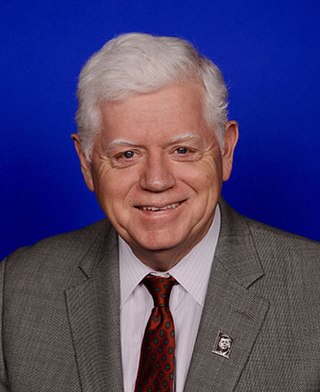
John Barry Larson is an American politician and businessman serving as the U.S. representative for Connecticut's 1st congressional district since 1999. The district is based in the state capital, Hartford. A member of the Democratic Party, Larson chaired the House Democratic Caucus during the 111th and 112th United States Congress.
Environmental Defense Fund or EDF is a United States-based nonprofit environmental advocacy group. The group is known for its work on issues including global warming, ecosystem restoration, oceans, and human health, and advocates using sound science, economics and law to find environmental solutions that work. It is nonpartisan, and its work often advocates market-based solutions to environmental problems.
The Center for Climate and Energy Solutions (C2ES) is an environmental nonprofit organization based in Arlington, Virginia. Launched in 2011, C2ES is the successor to the Pew Center on Global Climate Change. C2ES lobbies policymakers to promote their preferred policies at the state, national, and international levels.
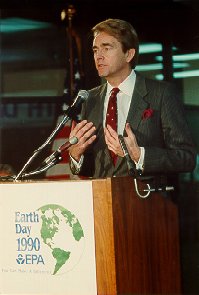
William Kane Reilly was Administrator of the Environmental Protection Agency under President George H. W. Bush. He has served as president of World Wildlife Fund, as a founder or advisor to several business ventures, and on many boards of directors. In 2010, he was appointed by President Barack Obama co-chair of the National Commission on the BP Deepwater Horizon Oil Spill and Offshore Drilling to investigate the oil spill in the Gulf of Mexico.

Joseph J. Romm is an American researcher, author, editor, physicist and climate expert, who advocates reducing greenhouse gas emissions to limit global warming and increasing energy security through energy efficiency and green energy technologies. Romm is a Fellow of the American Association for the Advancement of Science. In 2009, Rolling Stone magazine named Romm to its list of "100 People Who Are Changing America", and Time magazine named him one of its "Heroes of the Environment (2009)", calling him "The Web's most influential climate-change blogger".
Michael Oppenheimer is the Albert G. Milbank Professor of Geosciences and International Affairs in the Princeton School of Public and International Affairs, the Department of Geosciences, and the High Meadows Environmental Institute at Princeton University. He is the director of the Center for Policy Research on Energy and the Environment (C-PREE) at the Princeton School of Public and International Affairs and Faculty Associate of the Atmospheric and Ocean Sciences Program and the Princeton Institute for International and Regional Studies.

Fred Krupp has been the president of Environmental Defense Fund, a U.S.-based nonprofit environmental advocacy group since 1984. He has worked towards convincing corporations of the benefits of environmentalism. This has included convincing McDonald's and Duke Energy to make environmentally conscious business decisions. Krupp is also an advocate for legislative action on environmental issues; he successfully advocated for passage of the acid rain reduction plan in the 1990 Clean Air Act and the 2022 Inflation Reduction Act.
The Global Warming Solutions Act of 2006, or Assembly Bill (AB) 32, is a California state law that fights global warming by establishing a comprehensive program to reduce greenhouse gas emissions from all sources throughout the state. AB32 was co-authored by Assemblymember Fran Pavley and Speaker of the California Assembly Fabian Nunez and signed into law by Governor Arnold Schwarzenegger on September 27, 2006.
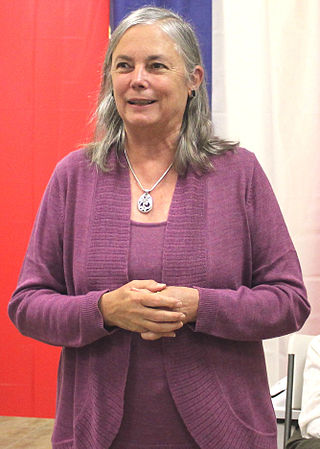
Frances J. "Fran" Pavley is an American politician who served two terms in the California State Senate and three terms in the California State Assembly. A Democrat, she last represented the 27th Senate District, which encompasses the Conejo Valley, and portions of the San Fernando and Santa Clarita Valleys. Due to term limits in California, Senator Pavley completed her legislative career in 2016. She is currently working as the Environmental Policy Director for the USC Schwarzenegger Institute.

Mark Diesendorf is an Australian academic and environmentalist, known for his work in sustainable development and renewable energy. He currently researches at the University of New South Wales, Australia. He was formerly professor of environmental science and founding director of the Institute for Sustainable Futures at the University of Technology, Sydney and before that a principal research scientist with CSIRO, where he was involved in early research on integrating wind power into electricity grids. His most recent books are The Path to a Sustainable Civilisation (2023) and Sustainable Energy Solutions for Climate Change (2014).
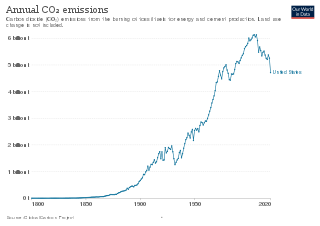
The environmental policy of the United States is a federal governmental action to regulate activities that have an environmental impact in the United States. The goal of environmental policy is to protect the environment for future generations while interfering as little as possible with the efficiency of commerce or the liberty of the people and to limit inequity in who is burdened with environmental costs. As his first official act bringing in the 1970s, President Richard Nixon signed the U.S. National Environmental Policy Act (NEPA) into law on New Years Day, 1970. Also in the same year, America began celebrating Earth Day, which has been called "the big bang of U.S. environmental politics, launching the country on a sweeping social learning curve about ecological management never before experienced or attempted in any other nation." NEPA established a comprehensive US national environmental policy and created the requirement to prepare an environmental impact statement for "major federal actions significantly affecting the quality of the environment." Author and consultant Charles H. Eccleston has called NEPA the world's "environmental Magna Carta".
The climate change policy of the United States has major impacts on global climate change and global climate change mitigation. This is because the United States is the second largest emitter of greenhouse gasses in the world after China, and is among the countries with the highest greenhouse gas emissions per person in the world. Cumulatively, the United States has emitted over a trillion metric tons of greenhouse gases, more than any country in the world.

The energy policy of the Obama administration was defined by an "all-of-the-above" approach which offered federal support for renewable energy deployment, increased domestic oil and gas extraction, and export of crude oil and natural gas. His presidency's first term was shaped by the failure of his signature climate legislation, the American Clean Energy and Security Act, to pass, and then climate and energy disasters including the Deepwater Horizon oil spill in 2010 and then Hurricane Sandy, which took place during the 2012 election. In his second term, Obama lifted the ban on crude oil exports and approved liquified natural gas exports; his planned regulatory approach to reducing greenhouse pollution in the electricity sector, the Clean Power Plan, was blocked by the U.S. Supreme Court.

Eileen B. Claussen is an American climate and energy policy administrator, diplomat, and lobbyist. She held senior posts at the U.S. Department of State, National Security Council, and Environmental Protection Agency before founding the Pew Center on Global Climate Change in 1998. She then launched the center's successor organization, the Center for Climate and Energy Solutions (C2ES), in 2011, and retired as president of C2ES in 2014.

Sir Dieter Robin Helm is a British economist and academic.

Robert Perciasepe is an American former government official who currently serves as a senior adviser to McKinsey and Company and the nonprofit Center for Climate and Energy Solutions, following his role as President of the organization. He served as the Deputy Administrator and Acting Administrator of the U.S. Environmental Protection Agency during the administration of Barack Obama.
Stephen Oliver Andersen is the Director of Research at the Institute for Governance & Sustainable Development (IGSD) and former co-chair (1989–2012) of the Montreal Protocol Technology and Economic Assessment Panel (TEAP) where he also chaired and co-chaired Technical Options Committees, Task Forces and Special Reports. He is one of the founders and leading figures in the success of the Montreal Protocol on Substances that Deplete the Ozone Layer that has phased out the chemicals that deplete the stratospheric ozone that protects the Earth against the harmful effects of ultraviolet radiation that causes skin cancer, cataracts, and suppression of the human immune system, destroys agricultural crops and natural ecosystems and deteriorates the built environment. Because ozone-depleting chemicals are also powerful greenhouse gases the Montreal Protocol also protected climate. Dr. Andersen was instrumental in the 2016 Kigali Amendment that will phase down hydrofluorocarbons once necessary to phase out chlorofluorocarbons (CFCs) fast enough to avoid ozone tipping points, but no longer necessary now that environmentally superior replacements are available or soon to be available. For his ambitious campaign saving the ozone layer, Dr. Andersen earned the 2021 Future of Life Award along with Joe Farman and Susan Solomon.
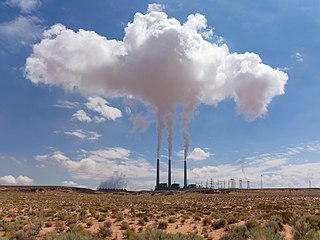
The Clean Power Plan was an Obama administration policy aimed at combating climate change that was first proposed by the Environmental Protection Agency (EPA) in June 2014. The final version of the plan was unveiled by President Barack Obama on August 3, 2015. Each state was assigned an individual goal for reducing carbon emissions, which could be accomplished how they saw fit, but with the possibility of the EPA stepping in if the state refused to submit a plan. If every state met its target, the plan was projected to reduce carbon emissions from electricity generation 32% by 2030, relative to 2005 levels, as well as achieving various health benefits due to reduced air pollution.

Michael Stanley Regan is an American environmental regulator. He has been serving as the 16th administrator of the Environmental Protection Agency since March 11, 2021. He is the first African American man to serve in the role.
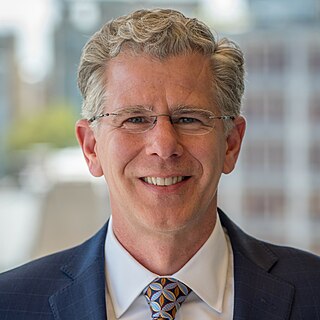
Richard G. Newell is an American energy economist, environmental economist, and climate policy expert who served as the seventh administrator of the United States Energy Information Administration from 2009 to 2011. He is currently the president and CEO of Resources for the Future, a nonprofit environmental economics research and policy institute in Washington, D.C. He has previously served as Senior Economist for Energy and Environment on the President's Council of Economic Advisers and as Professor of Energy and Environmental Economics at Duke University.
References
- ↑ "Georgia Levenson Keohane". New America. Retrieved 7 February 2018.
- 1 2 3 4 EDF (2012-09-14). "Nathaniel Keohane rejoins EDF as Vice President" . Retrieved 2013-08-23.
- 1 2 Darren Samuelsohn (January 3, 2011). "White House hires veteran environmental economist". Politico . Retrieved September 6, 2013.
- ↑ Statement of Nathaniel Keohane in "Hearing on The American Clean Energy Security Act of 2009" before the United States House Committee on Committee on Energy and Commerce, Subcommittee on Energy and Environment (April 21, 2009), "GPO Serial No. 111–29" (PDF). (45.2 MB), pp. 274–302.
- ↑ Statement of Nat Keohane in "Hearing on Allowance Allocation Policies in Climate Legislation: Assisting Consumers, Investing in a Clean Energy Future, and Adapting to Climate Change" before the United States House Committee on Committee on Energy and Commerce, Subcommittee on Energy and Environment (June 9, 2009), "GPO Serial No. 111–44" (PDF). (3.52 MB), pp. 189–98.
- ↑ Statement of Environmental Defense Fund in "Hearing on Policy Options to Prevent Climate Change" before the United States House Committee on Ways and Means (September 18, 2008), "GPO Serial No. 110-98" (PDF). (14.87 MB), pp. 208–12.
- ↑ Rob Kanter (November 1, 2009), "Panel to address aspects of policy on climate change", Champaign-Urbana News-Gazette
- 1 2 Keith Chu (June 11, 2009). "Anti-pollution efforts in D.C. may cost extra for Oregon power users". The Bulletin . Archived from the original on September 7, 2013. Retrieved September 6, 2013.
- ↑ Marc Gunther (May 15, 2008). "A $3 trillion climate change battle". CNN Money . Archived from the original on November 8, 2012. Retrieved September 6, 2013.
- ↑ Keohane, Nat (12 December 2007). "Time to Act, Not Despair". Environmental Defense Fund . Retrieved 2019-08-27.
- ↑ Erica Hill (December 7, 2009). "Climate Change Debate". CNN Tonight . Retrieved September 6, 2013.
- ↑ Diane Rehm (June 11, 2013). "The Economic Impact of Climate Change Policy". The Diane Rehm Show . Retrieved September 6, 2013.
- ↑ Staff writer (February 3, 2010). "Nat Keohane Of The Environmental Defense Fund: Cap & Trade Would Only Cost About $3 For The American People". RTT News. Retrieved September 6, 2013.
- ↑ Robert Bryce (April 2, 2012). "The 'Clean Energy' Stalking Horse". The Weekly Standard . Archived from the original on March 25, 2012. Retrieved September 6, 2013.
- ↑ Colman, Zack (May 24, 2021). "C2ES taps EDF's Keohane as new president". Politico.
- ↑ "Head of the Charles Course Records 2017". row2k. October 22, 2017. Retrieved November 1, 2021.